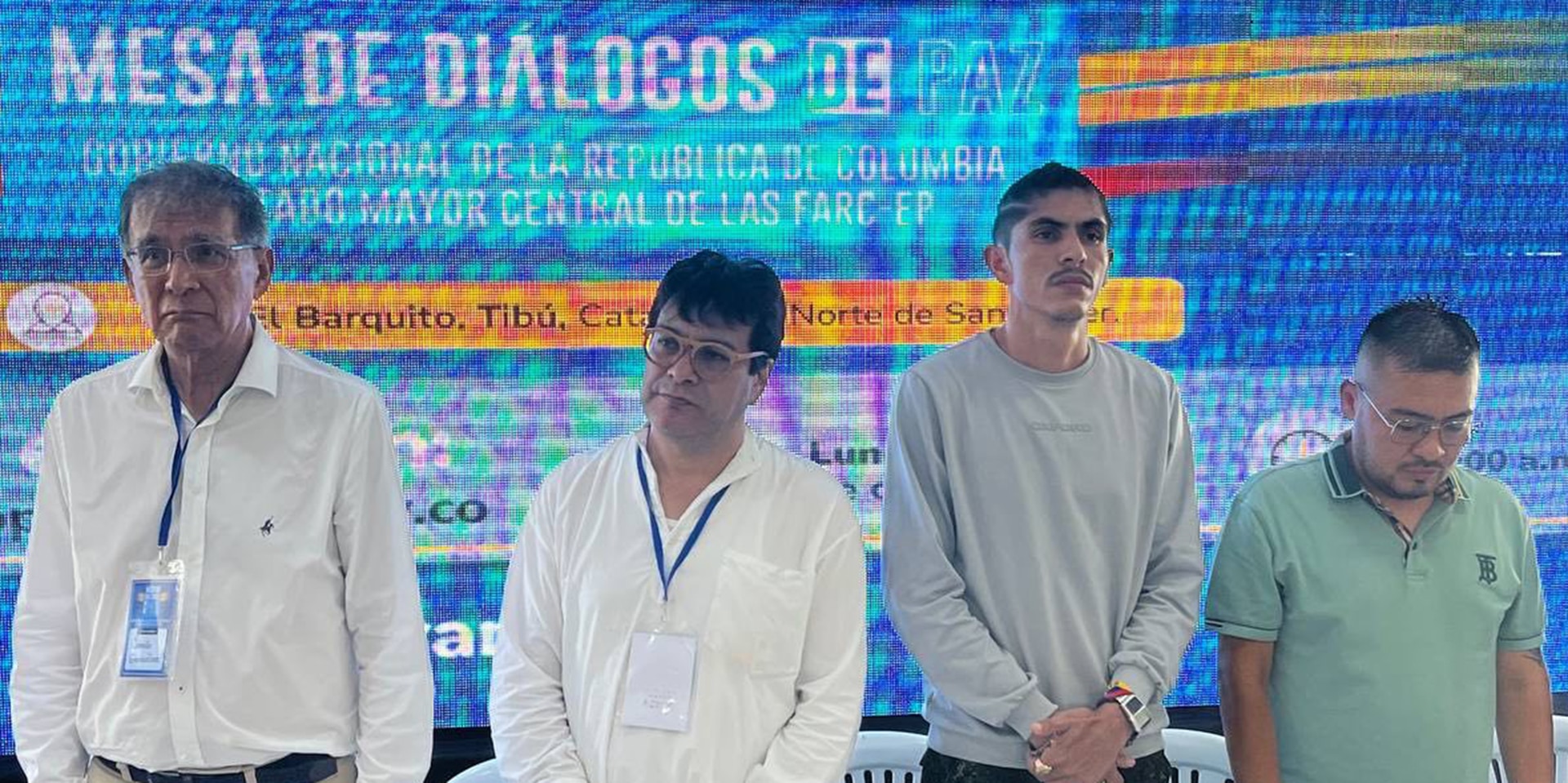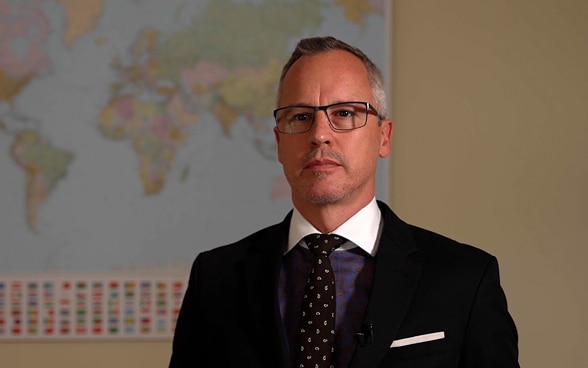Peace process in Colombia: Switzerland to serve as guarantor state in negotiations between government and rebels
As part of its long-standing peace policy in Colombia, on 16 October 2023 Switzerland took on an official mandate at the request of the Colombian government and the rebel group EMC (Estado Mayor Central de las FARC-EP) as guarantor of the peace negotiations. We interviewed Ambassador Simon Geissbühler, head of the FDFA's Peace and Human Rights Division (PHRD), to find out more.

Launch of peace negotiations: Camillo González (Government negotiator), Danilo Rueda (High Commissioner for Peace), Andrey Avendaño (EMC FARC-EP Negotiator) and Sebastián Martínez (EMC FARC-EP) (from left to right) on 16 October 2023 in Tibú. © FDFA
What is the significance of both parties having asked Switzerland for support in the negotiations?
The request is a clear sign that the parties trust Switzerland and its peace policy. The foundation of this trust includes Switzerland's long-standing local engagement of over 20 years working towards peace and promoting dialogue, even during periods less propitious to negotiations. Its broad-based cooperation programme, which includes units from SECO, the SDC and the PHRD, has a focus on peace.
Switzerland assisted in the negotiations of the 2016 peace agreement with the Revolutionary Armed Forces of Colombia – People's Army (FARC-EP) and has been helping to implement the agreement since then. Since November 2022, it has – together with Germany, Spain and Sweden – also been a member of the support group officially accompanying the negotiations between the Colombian government and the Ejército de Liberación Nacional (ELN). We can also make a positive impact in New York thanks to our seat on the UN Security Council.
Our work is appreciated, and actors in Colombia place great trust in Switzerland. Colombian President Gustavo Petro also underscored this during Swiss President Alain Berset's visit to Colombia in August 2023.

What are Switzerland's duties as a guarantor state in the peace negotiations in Colombia?
Aside from its presence at the table, Switzerland will focus on providing political and technical support for the negotiations, and offering its good offices during difficult patches. The guarantor states' presence and regular, direct exchanges with the parties will allow them to impact the negotiations for the better. For these states, ensuring their group's coordinated important. In addition to this, Switzerland attaches importance to respect for international humanitarian law, victims' rights, civil society participation and women's inclusion in the peace process, adherence to the 2016 peace agreement, and the complementarity of the negotiation processes within the framework of the Colombian government's holistic peace policy.
Switzerland has supported the peace process in Columbia for 20 years now. What has been achieved so far?
The 2016 peace agreement with the FARC-EP is a very comprehensive and inclusive peace agreement – also in international comparison looking many years back. It is currently being implemented.
Important progress has been made in the area of victims' rights: the Truth Commission published its report in mid-2022 and drew up recommendations for the state. The Special Justice for Peace and the Unit for the Search of Disappeared Persons are continuing their work in the area of dealing with the past.
In mid-2017, the process of the FARC-EP's demobilisation was completed. At that time, 7,000 FARC combatants and 6,000 militia members joined the process. The FARC-EP has transformed itself into a political party in the meantime and many former combatants are in the process of reintegration into society.
Negotiations with the ELN were resumed in November 2022 after having been broken off in 2019. Major steps forward have already been taken in the form of the August 2023 ceasefire and the launch of a national mechanism allowing the population to participate in the peace process.
Where do you see the biggest obstacles to achieving comprehensive peace?
The security situation remains a challenge. In many of the country's regions, violence has continued despite the end of the armed conflict with the FARC-EP, entailing grave humanitarian consequences for the civilian population. Ex-combatants, community leaders as well as human rights defenders are regularly killed. Since the peace agreement was signed, over 400 ex-combatants have been murdered. The UN Security Council therefore regularly takes up this matter.
The comprehensive approach to peace – 'Paz Total' – of President Petro's government is grounded in the experience that peace processes focusing on individual armed groups harbour the risk of allowing other groups' military strength to grow. In this vein, beyond an effective implementation of the 2016 peace agreement, the government aims to conduct negotiations with all existing armed actors. The launch of peace negotiations with the "Estado Mayor Central de las FARC-EP (EMC)" and the signing of a ceasefire are important steps.
Conducting multiple peace negotiations in parallel and coordinating these efforts is a challenge, logistically as well as substantively and politically. There will be further setbacks in the peace process. Nevertheless, today's Colombia is one of the world's few success stories of peacebuilding and conflict resolution. There is clear political will and positive momentum that is reinforced by the UN presence on the ground and the UN Security Council's close monitoring from New York.
Operationally, the PHRD coordinates Switzerland's support for the peace process. How does such cooperation work in practice? Do you have any local staff there on a permanent basis or is support provided mainly through the embassy?
The PHRD rapid action team which I put together handles overall coordination, including that of the cooperation between Bogotá and Bern. At the end of 2022, I also appointed a special envoy to accompany and support the processes together with our human security adviser on the ground, with Ambassador Eric Mayoraz, and with the entire embassy in Bogotá.
Where else is the PHRD currently involved in peace processes, apart from Colombia?
We are engaged in various peace processes and, with our 20 country-level peace policy programmes, have been contributing, among other things, our own expertise in preventing, de-escalating and resolving armed conflicts. But we also take advantage of opportunities and requests for support in mediation and dialogue processes. In 2023, we have continued our active support for the implementation of peace agreements in South Sudan and Mozambique. Switzerland is also providing dialogue support in Myanmar and in the context of Abkhazia, for example. It is also supporting the Kosovo–Serbia normalisation process.
In addition, we are committed to conflict prevention. In the Great Lakes region of Africa, Switzerland is helping to facilitate dialogue with paramilitary groups. In other contexts, however, we have had to fundamentally adapt (e.g. Sudan) or discontinue (Cameroon) our engagement. This year, we have received three new mandates, which we are carrying out in a targeted and very discrete manner.
In Ukraine, the focus in 2023 has been on people's needs for security and justice. The PHRD has been working towards having crimes documented and prosecuted by local and multilateral organisations, including the International Criminal Court. The country has also pursued its peace policy by advocating and supporting holistic reparation measures concerning all parties to the conflict. Such measures include the search and identification of missing persons.
In addition to direct mediation work, Switzerland strengthens multilateral and regional organisations with its expertise. The UN peace processes for Syria and Libya have benefited from this, as has the UN Peacebuilding Fund, active in over 30 countries.
